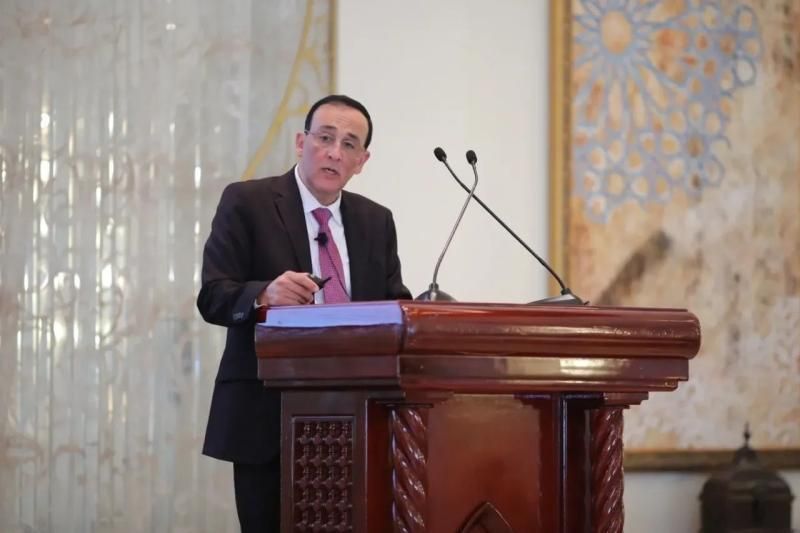|
|
TODAY.AZ / Business
Azerbaijan charts path for green economy through climate action [EXCLUSIVE]
01 May 2024 [08:30] - TODAY.AZ
 Ulviyya Shahin
Ulviyya Shahin
The Conference of the Parties (COP) stands as more than just a gathering of nations; it serves as a pivotal global platform dedicated to addressing the pressing issues of climate change. As we approach COP29, there is optimism among world experts regarding the event's potential impact.
One of the key issues to be addressed at COP29 is the gradual reduction of dependency on fossil fuels. While proposals in this regard are not new, the urgency to implement stronger measures has never been greater.
Dr. Frank Musmar, Executive Advisory Board President for the University of Maryland Global Campus, an advisory member at the Abrahamic Accord Business Circle, and a Board Member at Paris Metropolitan University, answered several questions in an interview with AZERNEWS.

Q. Dr. Musmar, as we know, COP is not just an international event but a global platform dedicated to discussing climate change issues with the participation of world countries and finding solutions to similar problems. The most pressing issue is the readiness of world countries to address these issues. So, do you think the world is ready for this monumental task?
A. Countries worldwide face a critical challenge- the need to halve global emissions in the next eight years. Without this, by the 2040s, we will likely breach the 1.5°C climate guardrail. This could leave a world of 10 to 12 billion people grappling with global warming of 3°C or more by 2100. The vast majority of actively publishing climate scientists (97 percent) agree that humans are causing global warming and climate change. In December 2015, 195 states signed up to the Paris Agreement. This is not just a pact but a lifeline for international cooperation in tackling climate change, and countries are taking steps to deliver on it. The UK, Norway, France, and New Zealand are some of the countries that have legally committed to reaching net zero emissions by 2050.
Steps in the right direction are being taken by countries that set targets for reaching net-zero emissions of CO2?and other greenhouse gases. Sweden and Norway were some of the first countries to legally commit to net-zero targets, and the UK was the first of the G7 major economies to do so with a commitment to reach net zero greenhouse gas emissions by 2050, closely followed by France. In 2020, China committed to reaching carbon neutrality by 2060, while South Korea and Japan committed to net zero emissions by 2050. Chile and Fiji are also among the countries that have proposed net-zero targets.?Net zero targets have gained increased momentum, and analysts suggest that from November 2021,?90% of global GDP was covered by net zero pledges. These are not just targets, but beacons of hope in our fight against climate change.
Q. World experts are quite optimistic about the COP event. In your opinion, what exceptional significance can this international event have in reducing unemployment worldwide?
A. Reducing poverty through productive, decent employment is essential for greater environmental sustainability. Economic growth at the expense of environmental quality is unsustainable and self-defeating, even in narrow economic cost/benefit terms. Private enterprises can significantly contribute to reducing greenhouse gas emissions and the ecological footprint in general through labor-management initiatives resulting in greener workplaces. Gains are often quickly achieved at a meager cost and without significant capital investment.
Moreover, the success of the whole range of mitigation policies and measures will depend on the capacities of those who need to respond and implement these decisions in enterprises and society. An effective response to climate change must mobilize millions of entrepreneurs and workers. Skill development among employers and workers and capacity building among government and administration services will significantly tackle climate change at all levels: national, regional, local, sectoral, and employment.
Q. Many countries currently depend on fossil fuels, and it is possible to reduce this dependency gradually. What new proposals do you think COP29 could put forward on this issue?
A. The proposals have existed since the first COP. However, the increase in green energy dependency is based only on the current policy settings of governments worldwide. If countries deliver on their national energy and climate pledges on time and as a whole, clean energy progress will move even faster. However, even stronger measures would still be needed to keep the goal of limiting global warming to 1.5 °C alive. Natural gas producers will still be looking to build their green energy supplies while investing in gas production because the globe still needs more gas now and in the coming years. For example, the EU is Azerbaijan's largest Gas trading partner, accounting for 66% of Azerbaijan's exports. Especially after Russia's full-scale invasion of Ukraine, Azerbaijan has become an important energy supplier for the EU. In July 2022, Brussels and Baku agreed to more than double gas supplies from Azerbaijan by 2027. However, this would require expanding the transit infrastructure and gas production itself.
Q. How is Azerbaijan's role evaluated on a global scale regarding the organization of COP29?
A. The most global impressions are that the COP will be chaired for the second year in a row by a country linked to the oil industry, which could lead to a potential conflict of interest. Some other anti-Azerbaijan countries will play the cards of freedom of speech, human rights, and Armenia’s relations as a critic of the country's policies to discredit Azerbaijan's legitimacy of holding the global event. However, holding the presidency of a U.N. climate summit has a massive influence on Azerbaijan's economic agenda and outcomes. The COP28 summit in the UAE has been the biggest yet, with more than 90,000 delegates registered.
Q. What support do you think Azerbaijan needs to continue its mission more successfully in the future?
A. First, to gain global support, Azerbaijan has to update and submit its national climate plan ahead of COP29. This plan is aligned with the 1.5C warming goal of the Paris Agreement. The last plan submitted to the UN pledged a 40 percent cut in greenhouse gas emissions by 2050 from 1990 levels, conditional on international support.
Second, advertise the latest agreements with the United States (a Major Player in the Russia-Ukraine war), which support boosting Azerbaijani gas exports to Europe. Both countries agreed to cooperate in the direction of US support for the expansion" of the Southern Gas corridor - the three pipelines that carry Azerbaijani gas exports to Europe.
URL: http://www.today.az/news/business/247770.html
 Print version
Print version
Connect with us. Get latest news and updates.
See Also
- 18 May 2024 [18:32]
Dagestan aims to boost agricultural exports to OEC Countries and Azerbaijan - 18 May 2024 [17:53]
Turkiye's Transport Minister highlights significance of Zangezur Corridor for global trade - 18 May 2024 [13:29]
Azerbaijan’s Prosecutor General enhances cooperation at ECO Meeting in Tajikistan - 18 May 2024 [12:47]
Azerbaijani oil prices climb - 18 May 2024 [11:25]
Global oil prices surge: Brent and Light Crude see increases - 18 May 2024 [10:50]
Azerbaijan and Cuba exchange views on COP29 Conference - 18 May 2024 [10:00]
Azerbaijan's GDP rises 4.3 percent to 38.2 billion manats - 18 May 2024 [08:30]
Azerbaijan's green initiative: COP29 as catalyst for sustainable investment [COMMENTARY] - 17 May 2024 [17:38]
AFEZ extends invitation to renewable energy sector - 17 May 2024 [16:10]
Azerbaijan fosters companies targeting green solutions: Deputy Energy Minister
Most Popular
 Presidents of Azerbaijan and Belarus visit Bulbul House-Museum in Shusha [PHOTOS]
Presidents of Azerbaijan and Belarus visit Bulbul House-Museum in Shusha [PHOTOS]
 Presidents of Azerbaijan and Belarus view bullet-riddled monuments [PHOTOS]
Presidents of Azerbaijan and Belarus view bullet-riddled monuments [PHOTOS]
 Presidents of Azerbaijan and Belarus familiarize themselves with Caspian Agro and InterFood Azerbaijan exhibitions [PHOTOS/VIDEO]
Presidents of Azerbaijan and Belarus familiarize themselves with Caspian Agro and InterFood Azerbaijan exhibitions [PHOTOS/VIDEO]
 Azerbaijan and Belarus sign documents [PHOTOS/VIDEO]
Azerbaijan and Belarus sign documents [PHOTOS/VIDEO]
 What kind of democracy "tourists" from EU teach Georgians?
What kind of democracy "tourists" from EU teach Georgians?
 Presidents of Azerbaijan and Belarus view Heydar Aliyev and Garabagh exhibition [PHOTOS]
Presidents of Azerbaijan and Belarus view Heydar Aliyev and Garabagh exhibition [PHOTOS]
 Azerbaijan, Belarus strengthen collaboration in urban planning, architecture
Azerbaijan, Belarus strengthen collaboration in urban planning, architecture
